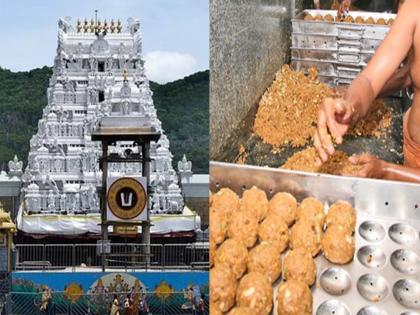Tirupati Laddus' Recipe Row: 300-Year-Old Tradition Altered, Now Generates Rs 500 Crore Annually!
By Lokmat English Desk | Updated: September 20, 2024 16:04 IST2024-09-20T16:03:59+5:302024-09-20T16:04:18+5:30
A controversy has erupted over the prasad from Tirupati Balaji in Andhra Pradesh. Chief Minister N. Chandrababu Naidu alleged ...

Tirupati Laddus' Recipe Row: 300-Year-Old Tradition Altered, Now Generates Rs 500 Crore Annually!
A controversy has erupted over the prasad from Tirupati Balaji in Andhra Pradesh. Chief Minister N. Chandrababu Naidu alleged that ghee used for Mahaprasadam during the previous Jagan Mohan Reddy government was adulterated with cow and pig fat. The TDP has accused the YSR Congress of offending Hindu sentiments, citing a report confirming that the ghee for the temple's laddus, made in the temple kitchen, was not pure.
Preparation of Tirupati Laddus
The process of making Mahaprasad laddu is known as 'Thittam,' where each ingredient is carefully measured. In its 300-year history, the recipe has been altered only six times. According to a 2016 report by the Tirumala Tirupati Devasthanams Board, these laddus possess a unique divine fragrance.
The preparation begins with making bundi from gram flour. To enhance preservation, jaggery pak is added. Finally, amla, cashews, and raisins are incorporated, with ghee used for making the bundi.
Daily Production and Significance of Tirupati Laddus
The Tirumala Tirupati Devasthanams (TTD) prepares an average of 300,000 laddus daily, generating approximately ₹500 crore annually from their sales. These laddus have been offered as prasad since 1715 and received a Geographical Indication (GI) tag in 2014, prohibiting anyone from selling laddus under this name. Rich in sugar, nuts, and raisins, each laddus typically weighs 175 grams.
Lab Report Findings on Tirupati Laddus
A lab test conducted in July revealed that the ghee used for prasad laddus at the Tirupati temple contained animal fats during the YSR Congress government's tenure. The analysis found traces of fish oil, beef fat, and semi-solid fat derived from pig tissues. The inquiry was initiated on July 23 after complaints about the laddus' taste. Additionally, coconut, cotton, and mustard oils were detected. In June, the TDP government appointed a senior IAS officer as the executive officer of the TTD.